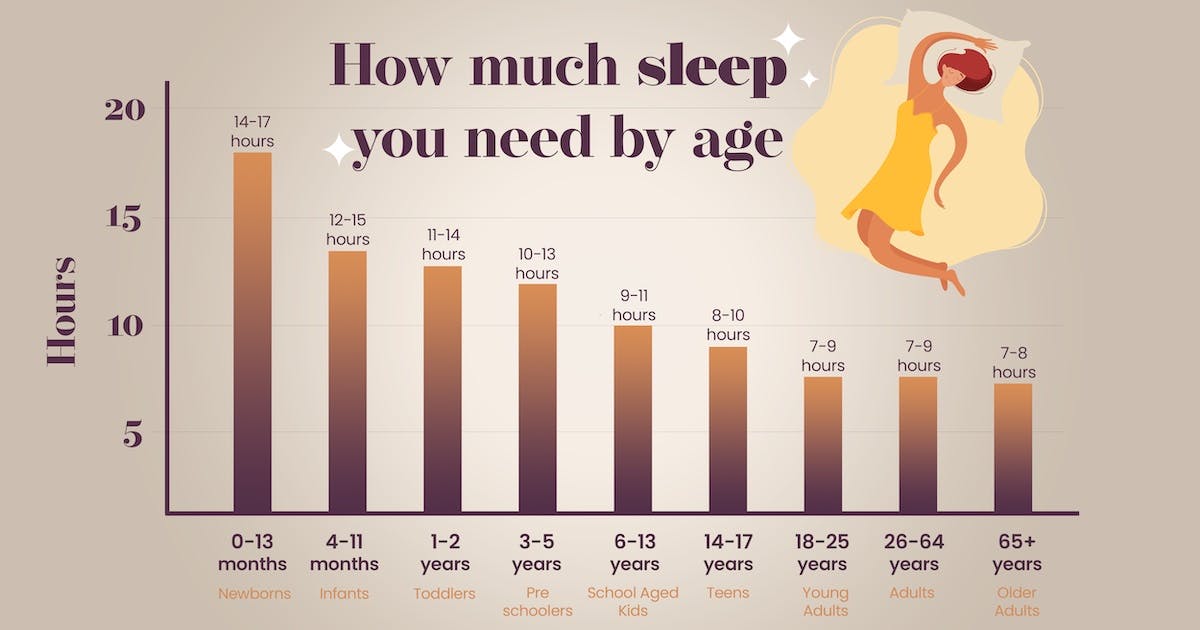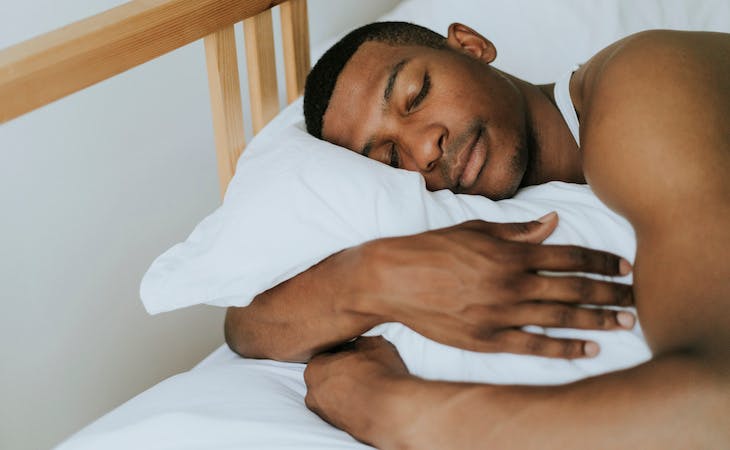We all know getting quality sleep is crucial for the health of your body—but a lack of sleep, or irregular sleep schedule, can harm your mental health and make it impossible to focus on tasks during the day. Sleep can affect everything from your energy levels to your memory and can even increase anxiety and stress.
The thing is, there’s no one-size-fits-all recommendation for how many Z’s you should be catching on any given night. In fact, the amount of sleep you should be getting really depends on your age—and other factors like gender and lifestyle play a role too.
To make it easy for you, we’re breaking down exactly how much sleep you need according to your age and sharing tips on how you can make sleep a priority going forward.
How much sleep do you need?
In general, the average adult needs seven to nine hours of sleep, according to the Centers for Disease Control and Prevention.
How, exactly, was that number established? It turns out sleep has been one of the most researched subjects by scientists over the last century—so there’s plenty of information available to back up this stat.
When scientists study the amount of sleep people need by age, they took a few factors into consideration. Usually, they look at the memory and cognitive functions of the people they’re studying, based on the number of hours they spend asleep.
For newborns, toddlers, and children, scientists also study their health as it relates to how well they’re growing for their age group. Based on the results, researchers have been able to determine a recommended set number of hours to sleep per age group.

Sleep recommendations by age
Check out this table for a quick breakdown of how many hours of sleep you should be working towards, depending on your age.
Age Group Age Range Recommended Amount of Sleep Newborns 0-3 months old 14-17 hours of sleep Infants 4-11 months old 12-15 hours of sleep Toddlers 1-2 years old 11-14 hours of sleep Pre-schoolers 3-5 years old 10-13 hours of sleep School-aged kids 6-13 years old 9-11 hours of sleep Teenagers 14-17 years old 8-10 hours of sleep Young adults 18-25 years old 7-9 hours of sleep Adults 26-64 years old 7-9 hours of sleep Older adults 65+ years old 7-8 hours of sleep
FAQs
Is 5 hours of sleep enough?
In short, no. Experts recommend at least seven hours for your body and mind to function at their best.
A 2018 study published in the journal Sleep found that “cognitive performance, measured using a set of 12 well-established tests, is impaired in people who reported typically sleeping less, or more, than seven to eight hours per night.” Even scarier, “a self-reported typical sleep duration of four hours per night was equivalent to aging eight years,” according to the study.
It’s imperative to your health to try to get at least seven hours of sleep each night; not doing so can have drastic effects on your health in the long run.
Is it better to get 6 or 8 hours of sleep?
It’s definitely better to get at least seven hours of sleep per night. Any amount of sleep less than seven hours can have long-lasting impacts on your health. Continued lack of sleep may have a direct impact on your heart health, mental health, and more.
How much sleep do you need by age?
Here’s a look at how much sleep you should be getting, depending on how old you are:
- Newborns (0-3 months): 14-17 hours
- Infants (4-11 months): 12-15 hours
- Toddlers (1-2 years): 11-14 hours
- Pre-schoolers (3-5 years): 10-13 hours
- School-aged kids (6-13 years): 9-11 hours
- Teens (14-17 years): 8-10 hours
- Young adults (18-25 years): 7-9 hours
- Adults (26-64 years): 7-9 hours
- Older adults (65+ years): 7-8 hours
Following an all-nighter, how much sleep should you get?
All-nighters are extremely disorienting, and you’ll probably feel the negative effects of pulling one immediately. If you want to get back on your sleep schedule after staying up all night, the best way to do so is to aim to resume your regular sleep schedule right away.
If you’re feeling extremely exhausted, you can try taking a quick nap that’s no longer than 30 minutes. This will help give you enough energy to get through the day and make it to nighttime. Then, resume your regular bedtime schedule at night.
What proportion of your sleep should be deep sleep?
Deep sleep, also known as “slow-wave sleep,” is the most restorative stage of sleep and should account for about 75% of the time you spend sleeping at night. Unlike rapid eye movement (REM) sleep, deep sleep slows down your heart rate, breathing, and eye movement.
Deep sleep is when your body repairs itself. If you feel like you’re constantly waking up throughout the night, try tiring yourself out more during the day and then creating a wind-down routine to teach your body it’s time for bed.
How to make sleep a priority
Just because you know how important it is to catch quality Z’s doesn’t mean getting the sleep you need will always come easily. To help improve your sleep habits so you can reach that magic number of seven to nine hours per night, try these expert-proven tips.
Stick to a regular sleep schedule, even on the weekends
We know it can be tempting to sleep until 11 on the weekends if you stayed out late the night before—but it’s not worth the toll it’ll take on your sleep schedule for the week. If you have an existing sleep schedule and wind-down routine set in place, it’ll be easier to stay on track without having to overthink it at times when it feels hardest to do so.
Add relaxing activities to your nighttime routine
One of the most effective ways to get quality sleep is to create a relaxing bedtime routine and stick with it. A few easy ways to unwind before bed include practicing deep breathing, stretching out your body, and creating a to-do list for the next day to ease anxious thoughts.
Avoid caffeine and alcohol too close to bedtime
Although alcohol may help you drift off to sleep faster, the quality of the sleep you receive will be severely diminished. Coffee could also be the secret culprit ruining your sleep at night. Experts recommend avoiding it after 2 p.m.
Set your bedroom to the right temperature
Experts agree 60-67 degrees Fahrenheit is the optimal temperature range for quality sleep at night. Your body heat rises at night, and if your bedroom is set to a temperature that’s too warm, you may wake up or stir throughout the night. So lower the temperature in your bedroom for more comfortable sleep.
Stay off your phone before bed
This rule is perhaps the most difficult to abide by, but it’s one of the most important things to master. Staring at blue light before you go to bed will confuse your body’s natural circadian rhythm so that it doesn’t know it’s to wind down. Your best bet is to shut your phone off at least 30 minutes before you go to bed.
Upgrade your mattress and bedding
Your mattress and bedding can go a long way toward improving your sleep. If you’re sleeping on a mattress that isn’t comfortable, chances are you won’t get quality sleep.
Saatva has a range of high-quality mattresses and bedding to suit your sleep style. Take our mattress quiz to find out what’s best for your sleep needs, then take advantage of our 365-night trial to try one out at home for improved sleep.







